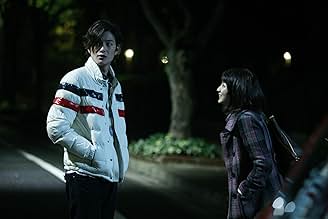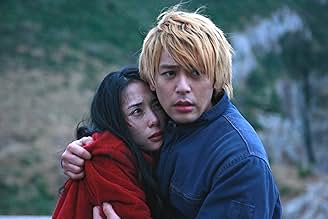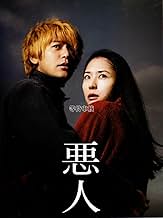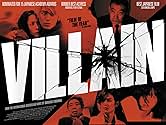AVALIAÇÃO DA IMDb
7,0/10
2,1 mil
SUA AVALIAÇÃO
Adicionar um enredo no seu idiomaA young woman's murder provokes reflection on the ugliness and villainy of modern society.A young woman's murder provokes reflection on the ugliness and villainy of modern society.A young woman's murder provokes reflection on the ugliness and villainy of modern society.
- Prêmios
- 14 vitórias e 11 indicações no total
Avaliações em destaque
Villain lost out at the 2011 Japan Academy Awards on the big prizes to Confessions. While Directing, Script and Best Picture went the way of the bleak, hyper-stylised Takako Matsu flick, all four acting awards were scooped by Villain. The reason for that split is abundantly clear.
Villain centres on lonely Yuichi who drives through the night and occasionally meets women through online dating sites. The forum for their meeting suggests each is as flawed as the other. When one assignation goes very badly indeed, something dark in Yuichi is unleashed. He then gets a message from another female via the site, and so two life-changing events take place within seconds of each other.
Villain explores complex questions of moral responsibility, the hypocrisy of social condemnation, and the extent of individual responsibility. The direction is workmanlike, and the framing rarely gets beyond a TV aesthetic. But the script is naturalistic and offers genuine insight, peaking in the father of the victim (Akira Emoto) revealing that hateful people are the way they are because they are too cowardly to risk caring for someone. Emoto and Kirin Kiki excel as the elder generation struggling to come to terms with the ugly turn the world has taken. Krini Kiki, faced with extortion, goes from bewilderment to fear to resignation all by changes of expression and never a word spoken. But it is the two young leads, Eri Fukatsu and Satoshi Tsumabuki, who truly excel here. Fukatsu especially shows a young woman capable of living with the emptiness inside her, until meeting someone who can fill it proves too much to bear. The cathartic peak of the film is her scene of self-awareness. Tsumabaki also gets to test his range at the end, but in a much more chilling and wonderfully ambiguous direction.
There are good guys and bad guys here, as you'd expect given the content, but they are not where you expect to find them. There is a murderer, but we are less convinced of our stance towards him than we are to the press-pack parasites, conman doctor, self-absorbed mother, and shallow and narcissistic university undergrad. A bus driver strangely earns our cheers, and is perhaps the only unambiguous 'good' character in the film. In a time where heinous crimes have become everyday and our ability to relate with one another seems fragmented and brutalised, the causes may not always be where the lazy self-appointed moral guardians in the media and corridors of power suggest they lie.
Villain is a slow build to its message, a slightly meandering survey of its theme, and the pacing can frustrate over the flabby 139 minutes. But it is worth sticking with for the questions it forces you to reflect on at the end, and the consummate acting. One of the best films to come out of Japan this century.
Villain centres on lonely Yuichi who drives through the night and occasionally meets women through online dating sites. The forum for their meeting suggests each is as flawed as the other. When one assignation goes very badly indeed, something dark in Yuichi is unleashed. He then gets a message from another female via the site, and so two life-changing events take place within seconds of each other.
Villain explores complex questions of moral responsibility, the hypocrisy of social condemnation, and the extent of individual responsibility. The direction is workmanlike, and the framing rarely gets beyond a TV aesthetic. But the script is naturalistic and offers genuine insight, peaking in the father of the victim (Akira Emoto) revealing that hateful people are the way they are because they are too cowardly to risk caring for someone. Emoto and Kirin Kiki excel as the elder generation struggling to come to terms with the ugly turn the world has taken. Krini Kiki, faced with extortion, goes from bewilderment to fear to resignation all by changes of expression and never a word spoken. But it is the two young leads, Eri Fukatsu and Satoshi Tsumabuki, who truly excel here. Fukatsu especially shows a young woman capable of living with the emptiness inside her, until meeting someone who can fill it proves too much to bear. The cathartic peak of the film is her scene of self-awareness. Tsumabaki also gets to test his range at the end, but in a much more chilling and wonderfully ambiguous direction.
There are good guys and bad guys here, as you'd expect given the content, but they are not where you expect to find them. There is a murderer, but we are less convinced of our stance towards him than we are to the press-pack parasites, conman doctor, self-absorbed mother, and shallow and narcissistic university undergrad. A bus driver strangely earns our cheers, and is perhaps the only unambiguous 'good' character in the film. In a time where heinous crimes have become everyday and our ability to relate with one another seems fragmented and brutalised, the causes may not always be where the lazy self-appointed moral guardians in the media and corridors of power suggest they lie.
Villain is a slow build to its message, a slightly meandering survey of its theme, and the pacing can frustrate over the flabby 139 minutes. But it is worth sticking with for the questions it forces you to reflect on at the end, and the consummate acting. One of the best films to come out of Japan this century.
There is only a simple message. Not sure about you but I kind of saw earlier on how the title of villain is indistinguishably played on the various characters and their actions in the storyline. Howerver, that being said, it is a well executed movie.
Japanese crime dramas, from books, TV is unlike the Western "Who doneit", but more of the question of How. Greate example is the TV series Ten to Sen (Dots to Line) http://www.imdb.com/title/tt1067131/ Lately, they go even beyond that from the 'How' to the 'Why'.
And so is Villain. Not over the top, fairly realistic especially on the flash back on the key event. Not shocking, one can relate to most who are involved, even college grad.
A social commentary on various things that can happen to any developed society. This case is kind of sad and to some degree fatalistic real - except the ending.
Acting is fairly good. Maybe a little too much background to the main characters but then again they are the main characters. The alternating amongst the many side of the issue is natural, completed and balanced.
Japanese crime dramas, from books, TV is unlike the Western "Who doneit", but more of the question of How. Greate example is the TV series Ten to Sen (Dots to Line) http://www.imdb.com/title/tt1067131/ Lately, they go even beyond that from the 'How' to the 'Why'.
And so is Villain. Not over the top, fairly realistic especially on the flash back on the key event. Not shocking, one can relate to most who are involved, even college grad.
A social commentary on various things that can happen to any developed society. This case is kind of sad and to some degree fatalistic real - except the ending.
Acting is fairly good. Maybe a little too much background to the main characters but then again they are the main characters. The alternating amongst the many side of the issue is natural, completed and balanced.
God, I wanted to rave about this film. 'Villain', billed as a gritty thriller from Japan, tells us in its plot synopsis that this is about the murder of a young woman and the search for the killer. I disagree completely. Even the genre in which its advertisers have pigeon holed it is incorrect. This is not a thriller – please don't enter the cinema expecting nerve jangling suspense. What we have here is the potential for a great film – and for the most part, what we are shown is excellent.
So I'll start with the positives, for when 'Villain' is good, it's incredible! 'Villain' does not follow the search for the killer at all – it largely follows the killer himself. There are a lot of characters in this movie, and a myriad of sub plots (which, incidentally, isn't beneficial – but more of that later). It is, as I saw it, a very slow, patient, observant film, which instead of reaching for cheap thrills and jump moments, is actually brave enough to step back and do something which very few films of this kind ever take the time to do: it peers into the misery and loneliness of its central characters, and their disillusionment concerning the immorality of the people around them. There is much cruelty in this film, and sharp prickles of nervousness and fear – but it is not a nasty story.
Undoubtedly the most successful plot line running through the film is, luckily, the one given the most attention: this is the relationship that is formed between Yuichi, our young murderer, and Mitsuyo, a lonely woman who works long hours selling suits and lodges with her sister and her sister's boyfriend. Their first meeting is embarrassing and ends horrifically – Yuichi, still consumed by guilt and anger, makes assumptions about Mitsuyo which he will later regret. Mitsuyo is desperate and understanding, and as the film goes on, we begin to understand just how much these two need each other.
Intercut with this is the storyline following the family of the murdered girl. This also is incredibly successful in the way in which it shows the grief of her parents – how they must come to terms with who their daughter really was, how they fight and turn on each other, and finally come to sad realisations, not only about themselves and their child, but about the people around her and them, and the corrosive cynicism and immorality of a new generation. Fair enough, on paper, that might sound a little pretentious, but unlike the majority of trashy whodunits that Hollywood churn out on an almost weekly basis, this is a film with much to say. It is deeply sad, and in many scenes, you can almost feel the director's sorrow and anger.
Less successful are plots involving Yuichi's grandmother and how she is cruelly scammed by her 'doctor' (this seems like a touch too far on the 'oh look at what a terrible society we live in' front), and the ending, although well meaning, is miscalculated. The way in which the director chooses to bring the relationship between Yuichi and Mitsuyo to a close seems like a strange choice – it might have worked, but nothing we have seen has led us to expect it, and as it comes so out of the blue, it is hard to believe in. It is, quite frankly, a bit of a cheat – a wrong footing that casts a somewhat distorted light on all the searing emotional honesty we have seen previous to that.
The film, however good some of the individual parts that make it up may be, is ultimately flawed. Clocking in at 2 hours and 20 minutes, it's about half an hour too long, and although the cinematography generally is exceptional (there's an inspired shot in which a flashback begins as the camera zooms into the pupil of a fish eye that will take the breath away from any film buff), the editing can sometimes be a little choppy. If only they had stuck with the love story at the movie's centre and the storyline involving the family of the dead girl, keeping the scenes with her father and the immoral young man that his daughter was smitten with, this would undoubtedly be one of the best films of the year. As it stands, 'Villain' is a good film – and despite its flaws, it's definitely worth the watch. I, for one, liked it very much.
So I'll start with the positives, for when 'Villain' is good, it's incredible! 'Villain' does not follow the search for the killer at all – it largely follows the killer himself. There are a lot of characters in this movie, and a myriad of sub plots (which, incidentally, isn't beneficial – but more of that later). It is, as I saw it, a very slow, patient, observant film, which instead of reaching for cheap thrills and jump moments, is actually brave enough to step back and do something which very few films of this kind ever take the time to do: it peers into the misery and loneliness of its central characters, and their disillusionment concerning the immorality of the people around them. There is much cruelty in this film, and sharp prickles of nervousness and fear – but it is not a nasty story.
Undoubtedly the most successful plot line running through the film is, luckily, the one given the most attention: this is the relationship that is formed between Yuichi, our young murderer, and Mitsuyo, a lonely woman who works long hours selling suits and lodges with her sister and her sister's boyfriend. Their first meeting is embarrassing and ends horrifically – Yuichi, still consumed by guilt and anger, makes assumptions about Mitsuyo which he will later regret. Mitsuyo is desperate and understanding, and as the film goes on, we begin to understand just how much these two need each other.
Intercut with this is the storyline following the family of the murdered girl. This also is incredibly successful in the way in which it shows the grief of her parents – how they must come to terms with who their daughter really was, how they fight and turn on each other, and finally come to sad realisations, not only about themselves and their child, but about the people around her and them, and the corrosive cynicism and immorality of a new generation. Fair enough, on paper, that might sound a little pretentious, but unlike the majority of trashy whodunits that Hollywood churn out on an almost weekly basis, this is a film with much to say. It is deeply sad, and in many scenes, you can almost feel the director's sorrow and anger.
Less successful are plots involving Yuichi's grandmother and how she is cruelly scammed by her 'doctor' (this seems like a touch too far on the 'oh look at what a terrible society we live in' front), and the ending, although well meaning, is miscalculated. The way in which the director chooses to bring the relationship between Yuichi and Mitsuyo to a close seems like a strange choice – it might have worked, but nothing we have seen has led us to expect it, and as it comes so out of the blue, it is hard to believe in. It is, quite frankly, a bit of a cheat – a wrong footing that casts a somewhat distorted light on all the searing emotional honesty we have seen previous to that.
The film, however good some of the individual parts that make it up may be, is ultimately flawed. Clocking in at 2 hours and 20 minutes, it's about half an hour too long, and although the cinematography generally is exceptional (there's an inspired shot in which a flashback begins as the camera zooms into the pupil of a fish eye that will take the breath away from any film buff), the editing can sometimes be a little choppy. If only they had stuck with the love story at the movie's centre and the storyline involving the family of the dead girl, keeping the scenes with her father and the immoral young man that his daughter was smitten with, this would undoubtedly be one of the best films of the year. As it stands, 'Villain' is a good film – and despite its flaws, it's definitely worth the watch. I, for one, liked it very much.
10Mignon00
The very first time I had seen this movie was a couple of years ago. Still, it made a strong impression on me as if I were watching it a few days ago.
This love story is doomed from the beginning. A young man who only wants to be loved instead of being a laughing stock and a young woman brave enough to love and accept the true colors of her final choice.
Is one rewarded or punished if after becoming a sinner we meet a saint? If so, is it because we are given the second chance or are we shown what was the right thing to do? To risk everything you have and you have known for and let your destiny to take over? Staying true to yourself is the bravest thing you can do.
This stunning movie is all about mixed emotions. What is your final though - it's up to you.
You won't regret.
This love story is doomed from the beginning. A young man who only wants to be loved instead of being a laughing stock and a young woman brave enough to love and accept the true colors of her final choice.
Is one rewarded or punished if after becoming a sinner we meet a saint? If so, is it because we are given the second chance or are we shown what was the right thing to do? To risk everything you have and you have known for and let your destiny to take over? Staying true to yourself is the bravest thing you can do.
This stunning movie is all about mixed emotions. What is your final though - it's up to you.
You won't regret.
Wonderful movie that had me captivated from the beginning, please find this movie! Very good acting for an Asian movie (lets be honest!), great concept, climatic ending and thought provoking. A great range of characters are employed and the handling of their relationships is sublime. Hopefully the messages of the movie won't be lost to those that check this out, if I could hint at some of what it meant to me I'd say life/people aren't as cut and dry or black and white as many would like to think they are. In many ways there are 'villainous' aspects to all of us and the lines between rage/hate/murder/condescension can blur together. Inhumanity, it seems we have to accept, is rather an intrinsic though unwanted/suppressed potentiality of our nature.
Você sabia?
Principais escolhas
Faça login para avaliar e ver a lista de recomendações personalizadas
Detalhes
Bilheteria
- Faturamento bruto mundial
- US$ 22.414.467
- Tempo de duração2 horas 19 minutos
- Cor
- Mixagem de som
- Proporção
- 1.85 : 1
Contribua para esta página
Sugerir uma alteração ou adicionar conteúdo ausente



























